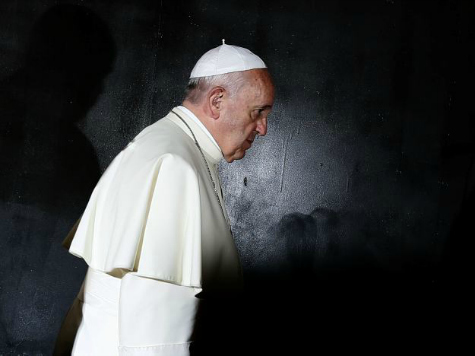“The pope? How many divisions has he got?”
Soviet leader Josef Stalin said this in May 1935 to French Foreign Minister Pierre Laval when it was suggested the officially atheist Soviet Union should encourage Christianity to gain the pope’s favor.
Whether you think faith had anything to do with it or not, the Soviet Union is no more, Russia has repositioned itself as a defender of Eastern Christianity, and the pope continues to wield the weapons he has – prayer and the power of the world’s biggest pulpit.
As reported by Catholic News Service, on Aug. 12, the Pontifical Council for Interreligious Dialogue released a statement (which wouldn’t happen without Pope Francis’s knowledge and assent) calling on Muslim leaders to condemn the “barbarity” and “unspeakable criminal acts” of Islamic militants targeting religious minorities in Iraq.
It said, “The plight of Christians, Yazidis and other religious and ethnic communities that are numeric minorities in Iraq demands a clear and courageous stance on the part of the religious leaders, especially Muslims, those engaged in interfaith dialogue and everyone of goodwill.”
It then outlines the “criminal acts,” including “the execrable practice of beheading, crucifixion and hanging of corpses in public places,” the abduction of Christian and Yazidi women and girls as “war booty,” female genital mutilation,” and forced conversions to Islam.
The document said, “No cause can justify such barbarity and certainly not a religion.”
Click here for the full text of the document, from La Stampa’s blog Vatican Insider.
On Aug. 10, Pope Francis named Cardinal Fernando Filoni, the Prefect of the Congregation for the Evangelization of Peoples, as his personal envoy to Iraq. As reported by Vatican Radio, plans are being made to bring all of the Holy See’s representatives in the war-torn region to Rome for a meeting on how to support the Christians being killed and terrorized by the Islamic State.
Vatican spokesman Father Federico Lombardi noted that Cardinal Filoni spent six years as papal nuncio (representative) to Jordan and Iraq during the last years of Saddam Hussein and the subsequent war in Iraq and that he was one of the few foreign diplomats to remain in Baghdad while it was being bombarded.
However, before both of these things happened, Pope Francis had already invoked the power of the pulpit in a direct appeal to the United Nations.
On Aug. 13, The Vatican released the full text of an Aug. 9 letter Pope Francis wrote to Secretary General Ban Ki-moon.
It reads:
It is with a heavy and anguished heart that I have beenfollowing the dramatic events of these past few days in Northern Iraq whereChristians and other religious minorities have been forced to flee from theirhomes and witness the destruction of their places of worship and religiouspatrimony. Moved by their plight, I have asked His Eminence Cardinal FernandoFiloni, Prefect of the Congregation for the Evangelization of Peoples, whoserved as the Representative of my predecessors, Pope St John Paul II and PopeBenedict XVI, to the people in Iraq, to manifest my spiritual closeness and toexpress my concern, and that of the entire Catholic Church, for the intolerablesuffering of those who only wish to live in peace, harmony and freedom in theland of their forefathers.
In the same spirit, I write to you, Mr. Secretary-General, andplace before you the tears, the suffering and the heartfelt cries of despair ofChristians and other religious minorities of the beloved land of Iraq. Inrenewing my urgent appeal to the international community to take action to endthe humanitarian tragedy now underway, I encourage all the competent organs ofthe United Nations, in particular those responsible for security, peace,humanitarian law and assistance to refugees, to continue their efforts inaccordance with the Preamble and relevant Articles of the United NationsCharter.
The violent attacks that are sweeping across Northern Iraqcannot but awaken the consciences of all men and women of goodwill to concreteacts of solidarity by protecting those affected or threatened by violence andassuring the necessary and urgent assistance for the many displaced people aswell as their safe return to their cities and their homes. The tragicexperiences of the Twentieth Century, and the most basic understanding of humandignity, compels the international community, particularly through the normsand mechanisms of international law, to do all that it can to stop and toprevent further systematic violence against ethnic and religious minorities.
Confident that my appeal, which I unite with those of theOriental Patriarchs and other religious leaders, will meet with a positivereply, I take this opportunity to renew to your Excellency the assurances of myhighest consideration.
From the Vatican, 9 August 2014

COMMENTS
Please let us know if you're having issues with commenting.